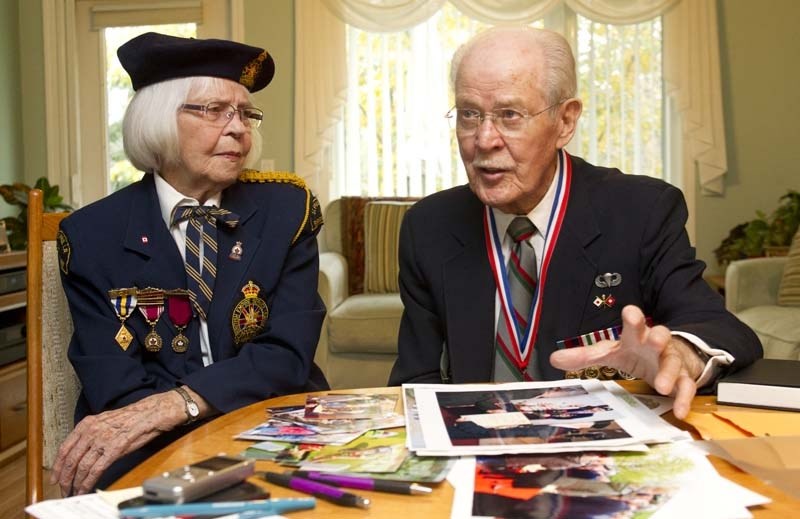Every year, Inez Jevning and Ken Froland find themselves in the same spot, standing in silence at a monument for a solider once unknown.
For the past eight years the sibling pair – Jevning of St. Albert and Froland, now of Los Angeles, California – have made this trip to the small village of Hoevelaken in the Netherlands, to remember a fallen soldier and a best friend.
Every April 19th, they commemorate the death of Private Walter Strang.
"I was a kid from the farm and I didn't know anything. He was older, he was wiser and he kind of took to me and I guess I took to him as well," said Froland, a 91-year-old veteran. He served in the Second World War with the Loyal Edmonton Regiment.
"In combat you get closer than brothers, you depend on him and he depends on you. (Otherwise) you're alone up there."
Strang, a trained radio operator who immigrated to Canada from Scotland before the war, was assigned to the Edmonton regiment in Italy to assist in pushing out the Germans in the north.
He and Strang were comrades, roommates, laundry buddies. But on April 19th, 1945 things changed.
The troops were temporarily stationed in Barnveld, the porch of a house was their makeshift radio communications room.
"There was a German roadblock up ahead and they said that they wanted somebody to go out there and knock out this roadblock," remembered Froland. "They needed a signalman to go with the combat group … Walter Strang said 'I'll go'. We never saw him again."
The troops found out Strang was dead by that afternoon, but never did find out what happened to him.
"I think it really hit Ken when (Strang) got killed because it could have been him. There were two (radio operators). If the (sergeant) had picked somebody, he could have picked Ken instead," added Jevning, Froland's 87-year-old sister.
Up until 2005 Strang was an unknown soldier, until two residents of Hoevelaken wanted to find out more about the man – only identified by his dog tags – who died in their own backyard.
Two years later, the Walter Strang Foundation was established to preserve the memory of the Allies involved in the liberation of Hoevelaken. Froland and two other members of the Loyal Edmonton Regiment attended the unveiling of a monument dedicated to Strang in 2008.
Every year since, Froland and Jevning return to commemorate his death and are constantly surprised by the respect and gratitude they receive from strangers.
"Canadians over there are awfully well received," noted Jevning, referring to a young couple who paid for their restaurant meal when several regiment members made the trip overseas one year. "We could hardly believe that they had so much respect."
On their annual visits, the foundation takes the pair to local primary schools where they become "show and tell."
Froland reminisced on the questions the kids typically ask: "What did you eat? Where did you go to the bathroom? Did you kill anyone?"
But he also reflected on how the children perceive a war that so severely scarred their grandparents and in some cases their parents.
He said that type of recognition is lost on Canadians.
"They forgot about us. They're only worried about the war that's going on now," he said. "They forgot about World War II and Vietnam. They don't have anything to remind them. These kids live it everyday."
Never forgotten
Reflecting on Strang's death, Froland can't help but remember all the close calls he had when he was on the front lines 68 years ago.
The first night his platoon spent in a dugout in Italy was one to remember.
"We all dug in and must have sat there for a couple days," he explained. "They started throwing mortars at us and the mortar (bombs) landed at the front end of my slit trench and just caved in the whole thing."
"I just about got a direct hit that time and my face was all bloodied up from dirt and rocks, maybe shrapnel too."
In Holland, a bullet from a sniper just barely missed his ear before he ducked behind a tree.
"I thought for sure I was going to get it that day. I counted my lucky stars."
Jevning's stories are less animated than her brother's, as she was at home when her husband Milton served on the frontlines.
She said Milton never talked about the war very much. Not until her trips to the Netherlands did she learn more about what he saw and what he endured as she stood on the same soil he did decades before.
"When he came home his legs were blue. Of course he couldn't wear shorts, he couldn't go swimming, people thought he had some sort of disease," said Jevning. When the Germans shot out the dykes, Canadian troops were left wading through three feet of icy seawater in the foxholes they were essentially living in.
Looking back, Froland is happy about his contribution to the war effort.
"I'm glad to be part of one of the greatest generations in history because during my generation so many new things happened. It's a generation that has seen a lot."
"There will never be another war like it," he noted.
Froland and Jevning plan to pay their respects to the soldiers that lost their life in war for as long as they can. This April will mark their ninth trip back to the Netherlands.




